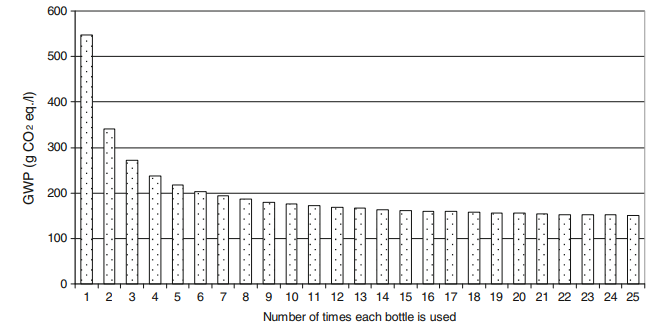Bring back the milkman
Reusable glass bottles are both good and cool


A free daily email with the biggest news stories of the day – and the best features from TheWeek.com
You are now subscribed
Your newsletter sign-up was successful
In films, one way of instantly signaling a quaint, old-fashioned setting is with a milkman. A trusty, white-clad man dropping off a fresh set of milk bottles and picking up the old ones says 1920s just as clearly as a title card.
However (as with many modern so-called conveniences), the way a milkman treated glass bottles is objectively far superior to how they are treated today. Whether it's for milk, beer, soda, water, or any other consumer use, it's time to bring back reusable glass bottles.
Now, the major reason milkmen existed back then was because refrigerators were rare, and so daily deliveries were necessary because milk would spoil within a day or so. That circumstance obviously doesn't apply today.
The Week
Escape your echo chamber. Get the facts behind the news, plus analysis from multiple perspectives.

Sign up for The Week's Free Newsletters
From our morning news briefing to a weekly Good News Newsletter, get the best of The Week delivered directly to your inbox.
From our morning news briefing to a weekly Good News Newsletter, get the best of The Week delivered directly to your inbox.
No, the lasting genius of the milkman system was that you could use the same bottles over and over and over. Instead of having to dig up new raw materials for every bottle (typically sand, sodium carbonate, lime, magnesium oxide, and aluminum oxide) to process, or crunch up a bunch of old bottles and melt them down, you just wash out the old ones and fill them right back up. They will break or wear out eventually, but with any luck you can get 10 or more uses out of a fresh one.
Recycling glass as many already do isn't pointless, of course. Crushing up old bottles creates what bottlers call "cullet," which is considerably more energy efficient than raw starting materials for making new glass (plus it can be recycled infinitely without any loss in quality). But the difference isn't that large, because you still have to carry out most of the energy-intensive melting processes — meaning an energy savings of only about 13 percent relative to new glass. Aluminum is far better in recycling terms, because smelting it from raw bauxite ore requires a tremendous amount of energy — meaning a 92 percent energy savings for recycled cans relative to new ones.
All that changes when we start talking about re-use. For every time a glass bottle is washed out and sent back, its energy cost can be spread out over another use. A British study of soda distribution found that reusing a glass bottle just once would cut its climate footprint by 40 percent, and reusing it three times would make it about equivalent to aluminum cans and plastic bottles. After 10 reuses the decline has largely tapered off, as the energy cost of washing and transport begin to predominate. Here are carbon dioxide equivalents plotted for the number of times a bottle is used:

(Courtesy The International Journal of Life Cycle Assessment)
A free daily email with the biggest news stories of the day – and the best features from TheWeek.com
Now, as is common with efficiency programs, the details matter a great deal, and the government would have to play a big role in making a modern milkman system happen. States or the feds would need to mandate that all bottlers use one of a few simple shapes and sizes (which would have to be a bit sturdier and heavier), so they can be produced as efficiently as possible and would all fit the same washing machinery. Industrial policy would have to ensure that all regions of the country have reasonable access to reprocessing facilities, so bottles don't have to be shipped back and forth thousands of miles at great energy cost. Then government would require a hefty deposit on each one — say fifty cents to a dollar, depending on size — to ensure that people actually bring them back.
But it certainly could be done. It's a simple and straightforward way to start cutting down climate emissions and raw materials usage while still allowing people to drink their milk, wine, beer, or soda.
Indeed, this should be viewed as just a first step in totally overhauling the American recycling system. We are (as usual) far behind Europe in this regard — Germany is reportedly the best in the world, recycling about 65 percent of its waste according to the OECD, nearly twice as much as our 35 percent. (Other studies have different figures, but by all accounts the U.S. is far behind the leaders.)
It's easier in the short term to have an incredibly wasteful society, where people enjoy their beverages and then discard the packaging. But the long-term consequences are large and increasingly apparent. Of course, the beverage industry is only a few percentage points at most of the emissions total, and packaging is only part of that fraction as well. But good climate policy will require carefully rooting around the entire society to plug up every little source of senseless waste to make every part of life as efficient as possible. Bringing back reusable bottles is a good place to start.
Ryan Cooper is a national correspondent at TheWeek.com. His work has appeared in the Washington Monthly, The New Republic, and the Washington Post.
-
 Why are election experts taking Trump’s midterm threats seriously?
Why are election experts taking Trump’s midterm threats seriously?IN THE SPOTLIGHT As the president muses about polling place deployments and a centralized electoral system aimed at one-party control, lawmakers are taking this administration at its word
-
 ‘Restaurateurs have become millionaires’
‘Restaurateurs have become millionaires’Instant Opinion Opinion, comment and editorials of the day
-
 Earth is rapidly approaching a ‘hothouse’ trajectory of warming
Earth is rapidly approaching a ‘hothouse’ trajectory of warmingThe explainer It may become impossible to fix
-
 The billionaires’ wealth tax: a catastrophe for California?
The billionaires’ wealth tax: a catastrophe for California?Talking Point Peter Thiel and Larry Page preparing to change state residency
-
 Bari Weiss’ ‘60 Minutes’ scandal is about more than one report
Bari Weiss’ ‘60 Minutes’ scandal is about more than one reportIN THE SPOTLIGHT By blocking an approved segment on a controversial prison holding US deportees in El Salvador, the editor-in-chief of CBS News has become the main story
-
 Has Zohran Mamdani shown the Democrats how to win again?
Has Zohran Mamdani shown the Democrats how to win again?Today’s Big Question New York City mayoral election touted as victory for left-wing populists but moderate centrist wins elsewhere present more complex path for Democratic Party
-
 Millions turn out for anti-Trump ‘No Kings’ rallies
Millions turn out for anti-Trump ‘No Kings’ ralliesSpeed Read An estimated 7 million people participated, 2 million more than at the first ‘No Kings’ protest in June
-
 Ghislaine Maxwell: angling for a Trump pardon
Ghislaine Maxwell: angling for a Trump pardonTalking Point Convicted sex trafficker's testimony could shed new light on president's links to Jeffrey Epstein
-
 The last words and final moments of 40 presidents
The last words and final moments of 40 presidentsThe Explainer Some are eloquent quotes worthy of the holders of the highest office in the nation, and others... aren't
-
 The JFK files: the truth at last?
The JFK files: the truth at last?In The Spotlight More than 64,000 previously classified documents relating the 1963 assassination of John F. Kennedy have been released by the Trump administration
-
 'Seriously, not literally': how should the world take Donald Trump?
'Seriously, not literally': how should the world take Donald Trump?Today's big question White House rhetoric and reality look likely to become increasingly blurred
